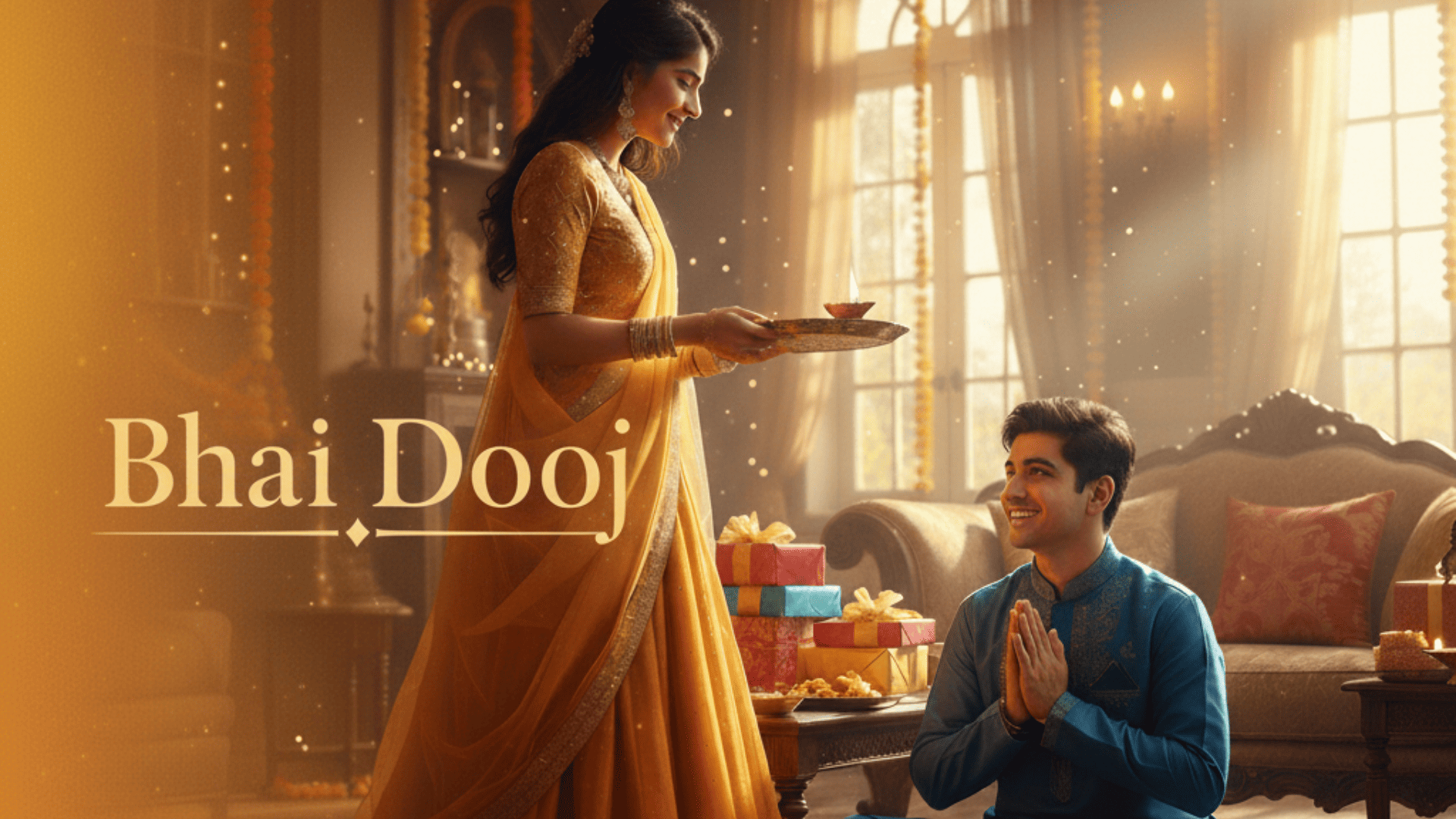Why Is Bhai Dooj Celebrated And What Does It Truly Symbolize?

Among the many festivals that celebrate the bond between siblings in India, one stands out for its emotional warmth and sacred traditions. Celebrated just after Diwali, this festival marks the beautiful connection between brothers and sisters, filled with affection, prayers, and lifelong promises. While it may appear as a day of rituals and gifts, its deeper meaning lies in love, protection, and gratitude. This festival is not just about customs; it’s about reaffirming relationships that sustain emotional strength and unity within families.
Mythological Origin and Significance
The roots of the festival can be traced back to ancient Hindu mythology. According to legend, when Lord Krishna visited his sister Subhadra after slaying the demon Narakasura, she welcomed him with sweets, flowers, and the ceremonial tilak on his forehead.
This act symbolized her prayers for his well-being and protection. It is on this foundation that Bhai Dooj has become a tradition, teaching the value of sibling love and the protection offered by mutual care. In another belief, Yama, the God of Death, visited his sister Yamuna on this day, and she greeted him with love and respect. Touched by her devotion, Yama granted that any brother who receives tilak and blessings from his sister on this day would enjoy long life and prosperity.
Rituals and Celebrations Across India
The celebration of this festival varies from region to region but retains a common essence the expression of love and gratitude between siblings. Sisters prepare a special aarti plate with roli, rice, sweets, and a diya. Brothers visit their sisters, receive the tilak, and exchange heartfelt gifts. Families share traditional meals, symbolizing togetherness and joy. In Maharashtra, the festival is known as “Bhau Beej,” while in Bengal, it is called “Bhai Phota.” In Nepal, it is celebrated as “Bhai Tika” during the Tihar festival. Regions celebrating Chhat Puja around the same time also emphasize devotion, gratitude, and family bonding, reflecting a shared spirit of cultural reverence. Despite linguistic and cultural differences, the sentiment remains the same: the wish for one another’s happiness, health, and protection.
The Symbolism of Love, Trust, and Renewal
At its heart, the festival embodies trust, emotional strength, and unconditional love between siblings. It is more than a ritual it is a reaffirmation of support and security. In a world where families are often separated by distance and busy lives, this festival reminds us of the importance of nurturing bonds that anchor our emotional well-being.
Through its simple yet profound traditions, it also symbolizes renewal a chance to reconnect, forgive past misunderstandings, and start afresh. The act of applying tilak and sharing food is not just ceremonial; it represents the spiritual energy of protection and compassion shared between brother and sister. This is where Bhai Dooj shows its deeper relevance, uniting generations through love and ritual.
Modern Relevance and Global Observance
In today’s fast-paced, digital world, many families celebrate the festival virtually, with online aartis, video calls, and digital gifts. Yet, the emotional essence remains untouched. Even abroad, Indian communities celebrate the festival with enthusiasm from London and New York to Dubai and Singapore. Sisters abroad prepare traditional sweets, while brothers send gifts and heartfelt messages across continents.
This modern observance highlights the timeless appeal of Indian traditions, their ability to adapt yet retain authenticity. Beyond religious significance, the festival emphasizes values like gratitude, love, and respect, which are universal and eternal. It teaches that relationships, when nurtured with care, become a source of lifelong joy and spiritual connection.
You can also watch: What to Expect for Career Growth This Year | Join AstroLive
Conclusion
Bhai Dooj stands as a radiant reminder of how sacred sibling bonds enrich life’s journey. Beyond rituals and cultural symbolism, it celebrates the power of love, the importance of protection, and the beauty of emotional unity. In a world that often prioritizes speed over sentiment, it restores balance reminding us that family ties and heartfelt connections are the truest sources of happiness and strength.
FAQs
Q1. What is the main significance of Bhai Dooj?
Bhai Dooj celebrates the sacred bond between brothers and sisters, emphasizing love, protection, and mutual respect, while also fostering spiritual discipline and family unity.
Q2. What are the traditional rituals observed during Bhai Dooj?
Sisters perform aarti, apply tilak on their brothers’ foreheads, offer sweets, and pray for their well-being, while brothers give gifts and pledge protection, strengthening emotional and spiritual bonds.
Q3. How do modern families celebrate Bhai Dooj?
Even in urban and international settings, families celebrate Bhai Dooj by performing traditional rituals, exchanging gifts, preparing festive meals, and reinforcing sibling bonds while maintaining cultural and spiritual values.
- Art
- Causes
- Crafts
- Dance
- Drinks
- Film
- Fitness
- Food
- الألعاب
- Gardening
- Health
- الرئيسية
- Literature
- Music
- Networking
- أخرى
- Party
- Religion
- Shopping
- Sports
- Theater
- Wellness






